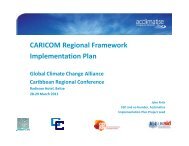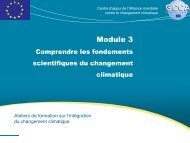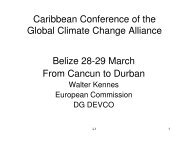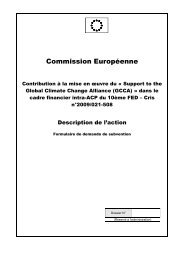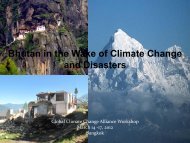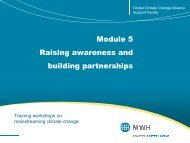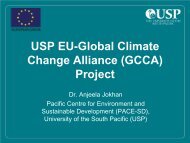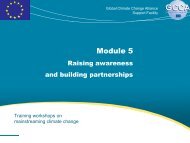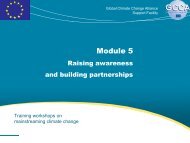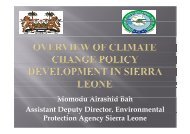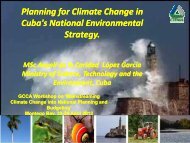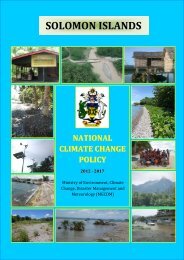Rwanda Green Growth Strategy 18nov11 - Global Climate Change ...
Rwanda Green Growth Strategy 18nov11 - Global Climate Change ...
Rwanda Green Growth Strategy 18nov11 - Global Climate Change ...
You also want an ePaper? Increase the reach of your titles
YUMPU automatically turns print PDFs into web optimized ePapers that Google loves.
Detailed Programmes of ActionProgramme 11: Ecotourism, Conservation and Payments forEcosystem ServicesResponsible Stakeholders (lead in bold)MINIRENA,RNRA, REMA, MINICOM, RDB, MINALOC, Civil Society, DPsSummary of Programmes and Actions<strong>Rwanda</strong>’s location within the centre of the Albertine Rift, a region considered to be the highest in speciesrichness in Africa, makes it ideal for conservation and ecotourism. Tourism represents <strong>Rwanda</strong>’s top foreignexchange earner, earning USD 202 million in 2008. Based on projected growth targets, tourism revenuesare anticipated to more than double by 2020 to USD 627 million. Ecotourism in envisioned destinationmanagement areas (DMAs) is likely to provide high returns on investment. In order to maintain <strong>Rwanda</strong>’sprotected areas as key economic assets supporting a climate-resilient services industry, havens forbiodiversity, and sources of vital ecosystem services, effective protection and sustainable managementmeasures must be undertaken. Action 1: Business tourism through strategic conference managementBusiness travellers make up an estimated 75% of tourists in <strong>Rwanda</strong>. The majority of tourism revenuescome from park entrance fees. <strong>Rwanda</strong> will promote business conferences beyond the current “highseason” in efforts to maximise the distribution and volume of business travellers throughout the year. Theseefforts will increase the bed occupancy rate of available hotels and lodges within Kigali, and subsequentvisitation to surrounding DMAs, including Volcanoes National Park (VNP), Nyungwe forest and AkageraNational Park. Action 2: Community-based ecotourismThe primary threats to <strong>Rwanda</strong>’s tourism assets are linked to population pressure, unsustainable resourceuse and endemic poverty. These are drivers of degradation surrounding park boundaries, threatening thelong-term sustainability and viability of ecotourism destinations. Households’ use of parks is often linked toseasonal stresses in the dry season, or “hungry gap”, when poor households look for bush meat, water andother non-timber forest products as sources of subsistence or income. Despite the existence of agovernment run community-benefit scheme derived from 5% of tourism revenues, insufficient resources areobtained by the poorest households. Households across all income groups receive an average of only USD0.36 per person per year in the case of VNP, and written application requirements act as a barrier to accessthe funds. <strong>Rwanda</strong> will increase the proportion of tourism revenues flowing into the community fund from5% to 10%, and will review application procedures and awareness to ensure participation in communitiesadjacent to parks. Action 3: Participatory Payments for Ecosystem Services (PES)In order to ensure the productive use of community benefit funds for sustainable park management,<strong>Rwanda</strong> will promote close ownership, participation and technical support of local communities. Futureschemes of high potential include community engagement in standalone or bundled PES schemes (carbon,biodiversity, water) through private, public or public-private operators. Promising projects include PESschemes with tea factories compensating forest-adjacent communities for water filtration services providedby protected areas (e.g. Nyungwe); and PES schemes to promote rehabilitation of degraded areas such asGishwati forest. In addition, engagement of community conservation wardens, women’s and youth groupsat the cell-level, along with incorporation of community participation targets within performance contracts ofDistrict Mayors, represent actions with high potential for ensuring PES scheme success and long-termsustainability.76Government of <strong>Rwanda</strong>



